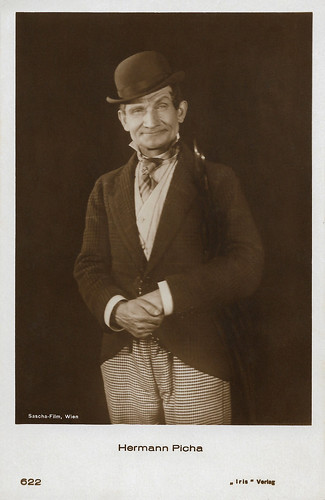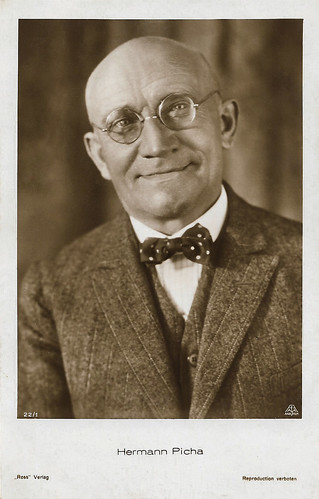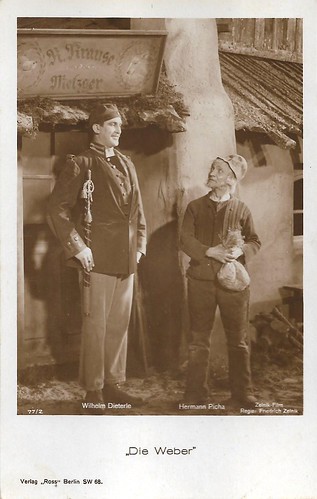
Austrian postcard by Iris- Verlag, no. 622. Photo: Sascha-Film, Wien.

German postcard by Ross Verlag, no. 22/1. Photo: Aafa-Film.
One of the most sought-after supporting actors
Hermann Picha was born Hermann August Carl Picher in 1865 in Charlottenburg (now Berlin), Germany. Hermann made his stage debut in 1885 in Jauer and then played in Detmold, Heilbronn and Hamburg. From 1890 to 1905 he acted at the Bellevue Theater in Stettin.
He became known as an eccentric mime and comedian. In 1905 he was engaged by the Berliner Theater in Berlin. Later, he worked on other Berlin stages such as the Großes Schauspielhaus, the Lustspielhaus and the Deutsches Künstlerhaus.
In 1914, he made his film debut probably in the silent thriller Das Panzergewölbe/The Armoured Vault (Joe May, 1914) starring Ernst Reicher. It was part of the Stuart Webbs series, popular during the silent era. In silent German cinema, he became one of the most sought-after supporting actors.
Picha was a specialist in grotesques or highly idiosyncratic types. Another popular mystery film was Das Derby/The Derby (Ewald André Dupont, 1919) starring Max Landa. He became a key supporting player for prominent directors of the German silent cinema.
He had a part in the success of some important film classics such as Ernst Lubitsch's Romeo und Julia im Schnee/Romeo and Juliet in the Snow (1920) starring Lotte Neumann, Fritz Lang's Der müde Tod/Destiny (1921), Joe May's Das indische Grabmal/The Indian Tomb (1921) and Friedrich Wilhelm Murnau's Tartüff/Tartuffe (1925).

German postcard by Ross Verlag, no. 634/6. Photo: May Film. Mia May and Michael Bohnen in Die Herrin der Welt/Mistress of the World (Joe May and others, 1919). The man with the top hat is Hermann Picha, who plays newspaper mogul Jonathan Fletcher.
The first-night audience booed
Occasionally Hermann Picha played starring roles in such films as the comedy Schneider Wibbel/Wibbel the Tailor (Manfred Noa, 1920) and he played the shoemaker Wilhelm Voigt in Der Hauptmann von Köpenick/The Captain from Köpenick (Siegfried Dessauer, 1926).
The German sound film banked on the comical talent of Hermann Picha too. He appeared in the popular operetta Der Bettelstudent/The Beggar Student (Victor Janson, 1931) with Jarmila Novotná and the comedy Paprika/Marriage in Haste (Carl Boese, 1932) starring Franciska Gaal, Paul Hörbiger and Paul Heidemann and made by the German branch of Universal Pictures.
Picha could be seen in the German Science-Fiction film Die Welt ohne Maske/The World Without a Mask (1934) directed by and starring Harry Piel. His final film was the drama Nur nicht weich werden, Susanne!/Don't Lose Heart, Suzanne! (Arzén von Cserépy, 1935) starring Jessie Vihrog and Veit Harlan.
The film offered support to the Nazi Party's anti-Semitic stance through a negative portrayal of the two Jewish film producers. It received strong official backing, and a gala premiere was arranged for its release by Joseph Goebbels. To Goebbels' surprise and disgust, the first-night audience booed, once the screening was over. The incident was largely hushed-up, and the film's director Arzén von Cserépy went back to his native Hungary in disgrace and never made another German film.
Hermann Picha died in 1936 in Berlin, Germany. Picha is buried in the II Municipal Cemetery Eythstraße in Berlin-Schöneberg.

German postcard by Ross Verlag, Berlin, no. 77/2 Photo: Zelnik-Film. Wilhelm Dieterle and Hermann Picha in Die Weber (Friedrich Zelnik, 1927).

German postcard by Ross Verlag, Berlin, no. 77/3. Photo: Zelnik-Film. Hertha von Walther, Wilhelm Dieterle and Hermann Picha in Die Weber (Friedrich Zelnik, 1927).
Sources: Wikipedia (English and German), and IMDb.
No comments:
Post a Comment